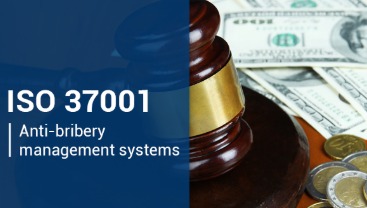Introduction
In an increasingly globalized business environment, organizations face growing challenges in maintaining integrity, transparency, and ethical practices. Bribery remains one of the most pervasive and damaging forms of corruption, undermining trust, distorting markets, and tarnishing reputations. To address this critical issue, the International Organization for Standardization (ISO) introduced ISO 37001:2016, the Anti-Bribery Management System (ABMS) standard.
This internationally recognized standard helps organizations of all sizes and sectors prevent, detect, and respond to bribery effectively. Implementing ISO 37001 demonstrates a company’s commitment to ethical conduct, transparency, and corporate governance.
What is ISO 37001:2016?
ISO 37001:2016 sets out the requirements and provides guidance for establishing, implementing, maintaining, reviewing, and improving an anti-bribery management system. The standard applies to both public and private sector organizations, regardless of their size or geographical location.
It is designed to help organizations:
-
Prevent bribery in their own operations.
-
Prevent bribery by or on behalf of the organization.
-
Promote a culture of integrity, transparency, and compliance.
ISO 37001 is a management system standard, which means it can be integrated with other ISO standards such as ISO 9001 (Quality Management System), ISO 45001 (Occupational Health and Safety), or ISO 14001 (Environmental Management System) to create a unified compliance framework.
Key Objectives of ISO 37001
The main goals of ISO 37001:2016 are to:
-
Reduce bribery risk across all levels of an organization.
-
Encourage transparency in business dealings and financial transactions.
-
Provide assurance to stakeholders that an effective anti-bribery system is in place.
-
Enhance corporate reputation and build stakeholder confidence.
-
Support compliance with anti-bribery laws and international regulations.
Core Components of ISO 37001
The ISO 37001 standard follows the Annex SL structure, which provides a consistent framework compatible with other management systems. Key components include:
-
Anti-Bribery Policy:
Organizations must establish and communicate an anti-bribery policy that clearly prohibits bribery and outlines consequences for violations.
-
Leadership and Commitment:
Top management plays a critical role in implementing the ABMS. Leadership must demonstrate commitment, allocate resources, and promote a culture of integrity.
-
Risk Assessment:
A systematic approach is required to identify and assess potential bribery risks across operations, projects, and business relationships.
-
Due Diligence:
Conducting due diligence on business associates, suppliers, contractors, and third parties is essential to evaluate bribery risks before entering partnerships.
-
Financial and Non-Financial Controls:
Implementing strict financial controls, such as approvals, audits, and transaction monitoring, helps reduce opportunities for bribery.
-
Training and Awareness:
Employees and associates should be trained to recognize, prevent, and report bribery. Awareness programs promote ethical behavior and compliance.
-
Reporting and Investigation:
Establishing clear reporting mechanisms (such as whistleblower systems) ensures that concerns can be raised confidentially and investigated promptly.
-
Monitoring and Review:
Regular internal audits and management reviews help ensure that the anti-bribery management system remains effective and up to date.
-
Continual Improvement:
Organizations should continuously improve their ABMS based on audit results, corrective actions, and feedback.
Benefits of ISO 37001 Certification
Implementing and achieving certification to ISO 37001:2016 offers numerous advantages for organizations:
-
Enhanced Reputation:
Certification signals to customers, investors, and regulators that the organization prioritizes ethical conduct and transparency.
-
Legal Compliance:
The standard supports compliance with anti-bribery laws such as the UK Bribery Act, U.S. Foreign Corrupt Practices Act (FCPA), and other national regulations.
-
Risk Reduction:
A proactive approach to identifying and mitigating bribery risks reduces financial and legal exposure.
-
Improved Governance:
ISO 37001 fosters strong corporate governance by establishing clear roles, responsibilities, and accountability for anti-bribery efforts.
-
Competitive Advantage:
Organizations with ISO 37001 certification can demonstrate trustworthiness, making them more attractive to clients and partners globally.
-
Employee Confidence:
A transparent and ethical workplace culture increases employee morale and reduces the likelihood of unethical practices.
-
Stakeholder Trust:
Certification provides assurance to stakeholders that the organization is committed to conducting business fairly and responsibly.
Who Can Implement ISO 37001?
ISO 37001:2016 is designed to be flexible and applicable to all types of organizations, including:
-
Private companies (large enterprises, SMEs, startups)
-
Public sector institutions and government bodies
-
Non-governmental organizations (NGOs)
-
Non-profit organizations
-
Multinational corporations
Regardless of size or sector, any organization can implement the standard to strengthen its integrity and ethical foundation.
Steps to Achieve ISO 37001 Certification
-
Gap Analysis:
Review existing policies and procedures against the ISO 37001 requirements to identify areas for improvement.
-
Develop Documentation:
Create or update your anti-bribery policy, risk assessment procedures, training programs, and reporting mechanisms.
-
Implementation:
Deploy the system across departments, ensuring employees and partners understand their responsibilities.
-
Internal Audit:
Conduct internal audits to verify compliance and identify any non-conformities.
-
Management Review:
Evaluate the performance of the ABMS and plan for continual improvement.
-
External Audit and Certification:
A certification body conducts an independent audit. Upon successful completion, the organization receives ISO 37001 certification.
Integration with Other ISO Standards
ISO 37001 can be seamlessly integrated with other management systems for greater efficiency and compliance. For example:
-
ISO 9001: To ensure quality and integrity in processes.
-
ISO 14001: To manage environmental responsibilities ethically.
-
ISO 45001: To maintain health, safety, and ethical standards.
-
ISO 27001: To ensure secure handling of sensitive data during anti-bribery procedures.
This integration helps build a robust, unified management framework promoting sustainable and responsible business practices.
Conclusion
Bribery can have devastating effects on businesses, economies, and societies. ISO 37001:2016 serves as a powerful tool for organizations seeking to combat corruption, enhance transparency, and promote ethical behavior.
By implementing an Anti-Bribery Management System (ABMS), companies not only safeguard their reputation but also strengthen stakeholder confidence and ensure compliance with international legal frameworks.
In today’s competitive and integrity-driven world, achieving ISO 37001 certification is not just a mark of compliance—it’s a statement of trust, responsibility, and leadership in ethical business conduct.







